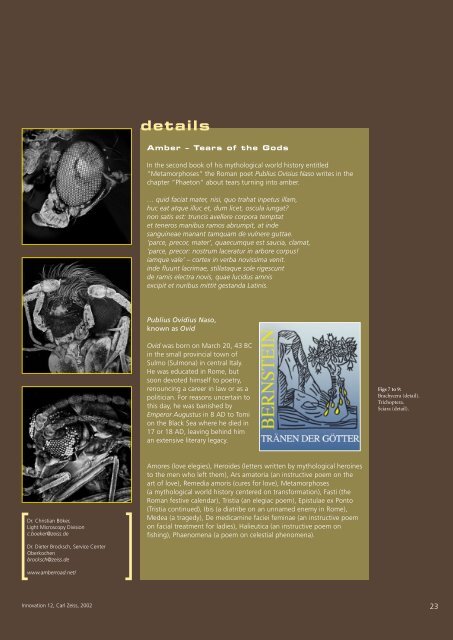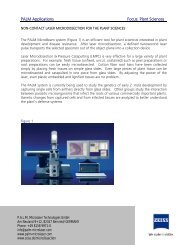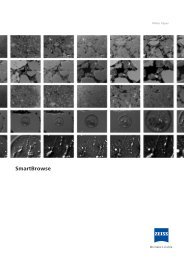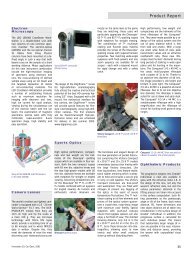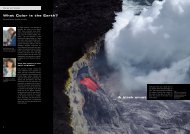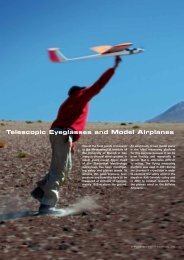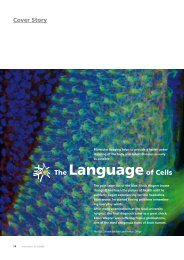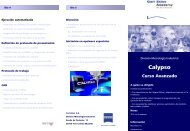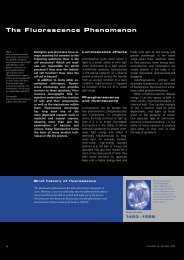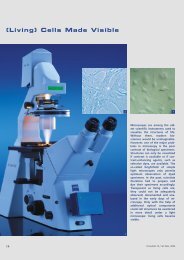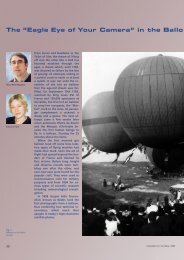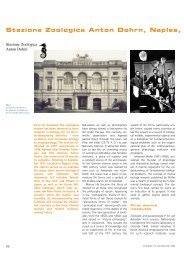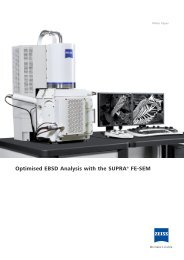Fascinating Amber - Carl Zeiss, Inc.
Fascinating Amber - Carl Zeiss, Inc.
Fascinating Amber - Carl Zeiss, Inc.
Create successful ePaper yourself
Turn your PDF publications into a flip-book with our unique Google optimized e-Paper software.
details<br />
<strong>Amber</strong> – Tears of the Gods<br />
In the second book of his mythological world history entitled<br />
“Metamorphoses“ the Roman poet Publius Ovisius Naso writes in the<br />
chapter “Phaeton“ about tears turning into amber.<br />
… quid faciat mater, nisi, quo trahat inpetus illam,<br />
huc eat atque illuc et, dum licet, oscula iungat?<br />
non satis est: truncis avellere corpora temptat<br />
et teneros manibus ramos abrumpit, at inde<br />
sanguineae manant tamquam de vulnere guttae.<br />
‘parce, precor, mater’, quaecumque est saucia, clamat,<br />
‘parce, precor: nostrum laceratur in arbore corpus!<br />
iamque vale’ – cortex in verba novissima venit.<br />
inde fluunt lacrimae, stillataque sole rigescunt<br />
de ramis electra novis, quae lucidus amnis<br />
excipit et nuribus mittit gestanda Latinis.<br />
Publius Ovidius Naso,<br />
known as Ovid<br />
Ovid was born on March 20, 43 BC<br />
in the small provincial town of<br />
Sulmo (Sulmona) in central Italy.<br />
He was educated in Rome, but<br />
soon devoted himself to poetry,<br />
renouncing a career in law or as a<br />
politician. For reasons uncertain to<br />
this day, he was banished by<br />
Emperor Augustus in 8 AD to Tomi<br />
on the Black Sea where he died in<br />
17 or 18 AD, leaving behind him<br />
an extensive literary legacy.<br />
Figs 7 to 9:<br />
Brachycera (detail).<br />
Trichoptera.<br />
Sciara (detail).<br />
Dr. Christian Böker,<br />
Light Microscopy Division<br />
c.boeker@zeiss.de<br />
Amores (love elegies), Heroides (letters written by mythological heroines<br />
to the men who left them), Ars amatoria (an instructive poem on the<br />
art of love), Remedia amoris (cures for love), Metamorphoses<br />
(a mythological world history centered on transformation), Fasti (the<br />
Roman festive calendar), Tristia (an elegiac poem), Epistulae ex Ponto<br />
(Tristia continued), Ibis (a diatribe on an unnamed enemy in Rome),<br />
Medea (a tragedy), De medicamine faciei feminae (an instructive poem<br />
on facial treatment for ladies), Halieutica (an instructive poem on<br />
fishing), Phaenomena (a poem on celestial phenomena).<br />
Dr. Dieter Brocksch, Service Center<br />
Oberkochen<br />
brocksch@zeiss.de<br />
www.amberroad.net/<br />
Innovation 12, <strong>Carl</strong> <strong>Zeiss</strong>, 2002<br />
23


